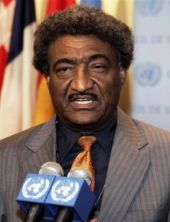Sudan demands restricting ICC’s prosecutor visits to UN
By Wasil Ali
May 6, 2007 (NEW YORK) — Sudan’s envoy to the UN accused the chief prosecutor of the International Criminal Court (ICC), Luis Moreno-Ocampo, of jeopardizing Darfur peace process, requesting to restrict his visits to UN headquarters.

The judges of the ICC issued their first arrest warrants for suspects accused of war crimes in Sudan’s Darfur region last week. The warrants were issued for Ahmed Haroun, state minister for humanitarian affairs, and militia commander Ali Mohamed Ali Abdelrahman, also know as Ali Kushayb. Sudan has so far rejected handing over the two suspects.
Abdalmahmood alleged that Ocampo is asking UN Security Council envoys on a regular basis to pressure Sudan. He demanded that the ICC prosecutor reduce the number of visits he makes to New York to avoid “jeopardizing the Darfur peace process”. Abdalmahmood implied that Ocampo should be allowed to come to the UN only for his semi-annual reports on the Darfur case.
The statements by Sudan’s UN envoy are the latest in a series of a bitter and negative campaign against ICC’s chief prosecutor by Khartoum. Sudanese officials have been particularly upset by Ocampo’s statements following the issuance of the arrest warrants, in which he said that Haroun and Kushayb “will have to face justice, they will be in the dock, in two months or two years”. The Sudanese government has interpreted it to indicate a pre-judgment by the ICC against the two suspects.
The Sudanese justice Minister Mohamed Ali Al-Mardi that this statement demonstrates his “incorrect understanding of justice” and described attempts to arrest any Sudanese national by ICC “an international piracy.”
If Sudan fails to comply with a summons to appear order issued by the ICC judges on a specified date an arrest warrant is issued for the named suspects. The arrest warrant will then be transmitted to the states that are parties to the Rome Statue and to the International Criminal Police Organization (Interpol) to execute. It is also expected that the UN Security Council would address Sudan’s failure to cooperate with the ICC as spelled out in resolution 1593 referring the situation in Darfur to the ICC.
Sudan has not ratified the Rome Statue, but the UN Security Council triggered the provisions under the Statue that enables it to refer situations in non-State parties to the world court if it deems that it is a threat to international peace and security.
(ST)
